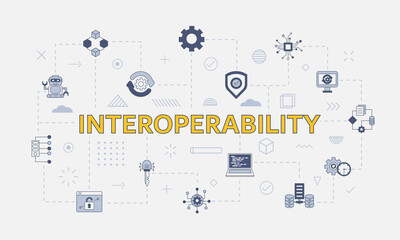Digital and Connected Healthcare
Top 3 Tech Trends in Interoperability
Read Time 5 mins | Written by: Anuj Kharnal

The trend in interoperability in healthcare is focused on increasing the use of open standards and technologies to enable different medical systems to communicate and share data and resources seamlessly. This includes the adoption of standards such as the Health Level 7 (HL7) and Fast Healthcare Interoperability Resources (FHIR), as well as the use of frameworks such as the Consolidated Clinical Document Architecture (CCDA) and Clinical Document Architecture (CDA).
The use of open standards and technologies for interoperability in healthcare has several benefits. It allows healthcare providers to access and use a wide range of information and services, providing them with a more complete picture of a patient's health. This can help to identify potential issues and provide timely treatment, improving patient outcomes.
In addition, the use of open standards and technologies for interoperability in healthcare also helps to promote innovation and competition. Allowing different medical systems to work together enables new and emerging technologies to enter the market more easily, providing healthcare providers with a wider range of choices and options. This can help to drive innovation and competition, leading to better products and services.
Furthermore, the use of open standards and technologies for interoperability in healthcare also helps to support the growth of the global digital economy. By enabling different medical systems to communicate and share data and resources, it helps to create a more connected and seamless healthcare environment. This can help to facilitate the growth of online health services and markets, providing a boost to the global economy.
Another trend in interoperability in healthcare is the increasing use of cloud-based technologies and services. This allows healthcare providers to access and use a wide range of information and services from any location, using any device. This can help to improve the flexibility and accessibility of healthcare, enabling patients to receive care wherever they are.
Using cloud-based technologies and services to make healthcare systems more interoperable has a number of other benefits as well. For example, it lets doctors and nurses store and organize a lot of data and information, which gives them a fuller picture of a patient's health. This can help to improve the accuracy and efficiency of data exchange, enabling healthcare providers to make more informed decisions.
Using cloud-based technologies and services for interoperability in healthcare also helps to lower costs and make things safer. By using the cloud, healthcare providers can access and use a wide range of services and applications without having to invest in expensive hardware and software. This can help to reduce costs and improve efficiency. Also, using the cloud can help improve security because it lets healthcare providers store and manage information and data in a safe and controlled environment.
AI and machine learning are being used more and more in healthcare, which is another trend toward interoperability. This includes the use of natural language processing (NLP) to extract information from unstructured data, as well as the use of predictive analytics to identify potential issues and provide timely treatment.
The use of AI and machine learning for interoperability in healthcare has several benefits. It can help make the data exchange more accurate and efficient, which can help healthcare providers make better decisions. In addition, it can also help reduce healthcare providers' workload, enabling them to focus on more complex tasks.
Also, using AI and machine learning to make healthcare systems work together can help improve the quality of patient care. By using predictive analytics, healthcare providers can find potential problems and treat them quickly, which improves the health of their patients. Also, using NLP can help make data exchanges more accurate and efficient, giving healthcare providers access to and the ability to use a wide range of information and services.
Overall, the trends in interoperability in healthcare are focused on enabling different medical systems to communicate and share information that leads to informed decision-making and improved patient outcomes.

